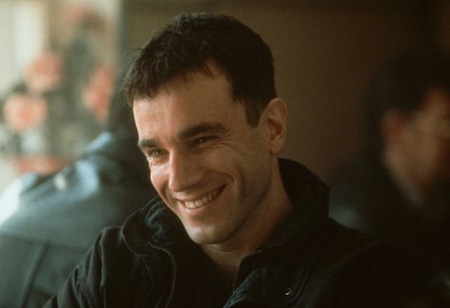
The Film: The Boxer (1997)
The Principles: Director: Jim Sheridan. Daniel Day-Lewis, Emily Watson, Brian Cox, Gerard McSorley
The Premise: Danny Flynn (Day-Lewis) is released from prison on the eve of the Good Friday talks. He’s served fourteen years for his involvement in the IRA, and he returns to his poor Belfast neighborhood as a lonely and broken man. He’s determined to have his life back though, and returns to the gym of his past glories to train young boxers. More than anything, Flynn wants a life of peace, and he seeks to unify the Catholic and Protestant kids of his neighborhood. But his past associates, seething with old hatreds, are determined to not only sabotage his life, but the entire peace process itself.
Making matters even more complicated is Maggie (Watson), who was Flynn’s lover before he went to prison. She married his best friend who is also in prison, and has a child with him. This marks her as a Prisoner’s Wife, a martyr and symbol to the community, and prevents her from living or loving at all openly. Maggie and Danny struggle with their old feelings, and are forced to hide from individuals who prefer to use their private life for violent and public ends.

Is It Good: It’s very good. There’s no shortage of films that delve into the IRA, but they tend to focus on the most dramatic and extreme periods of their long and violent history. You either get a movie about Michael Collins and the fight for independence, or you get a story set in the bloody and terrifying time of the 1970s and 1980s. The Boxer is unique in its late ’90s setting, focusing on a period of uncertainty and emphasizing the exhaustion of bloody and battered region. Instead of picking one side or the other, it’s brave in suggesting that for some, it becomes less about a cause and more about an addiction to violence, rallies, and fiery rhetoric.
It’s also a very simple story. Danny and Maggie are two people caught and churned up in a struggle. They’re resigned to its rule over their lives, but it doesn’t define them or their interactions with each other. The film doesn’t try and connect them to the bigger picture of Irish history, it’s simply a backdrop to their furtive cups of tea, and childhood memories.
There are a few moments that are a little too heavy handed and sentimental, but I think Sheridan can be allowed a little emotional excess. He still paints a very bleak and poor picture, and is visibly disgusted with The Cause.

Is It Worth A Look: Absolutely. It’s a film that’s fallen through the cracks a little bit, as it’s not one of Day-Lewis’ bombastic and flashy performances. While I fully admire the work that goes into his butchers and oilmen, I always find myself returning to and admiring his restrained performances more. (The contrast against the psychos probably helps, though.) As Danny Flynn he is boyish and tragic. His is a life interrupted, and every time he smiles, you see a 19 year old looking out from behind an older man’s face. It isn’t that he is immature, it’s simply that he froze up inside his own soul.
Watson is also terrific, and her performance really mirrors Day-Lewis’. She was forced to grow up and move on, but every movement she makes indicates just how much it hurt and cost her. The fact that she’s locked up and preserved like some kind of nun or medieval bride due is really quite chilling and cruel.
I’ve focused a lot on the love story (which is really the heart of the film) but I promise there’s some white-knuckle moments too. The last half hour or so is unbelievably tense, though some might be a little angry at its end.
Cinematic Anecdotes: This may be a quiet performance from Day-Lewis, but he still threw himself into it. He spent three years training to box. The man has never, ever phoned it in. No wonder this was one of his last, pre-cobbling career films.
The Boxer is on Netflix Instant Watch should you need something to bring you down from the Guinness.
